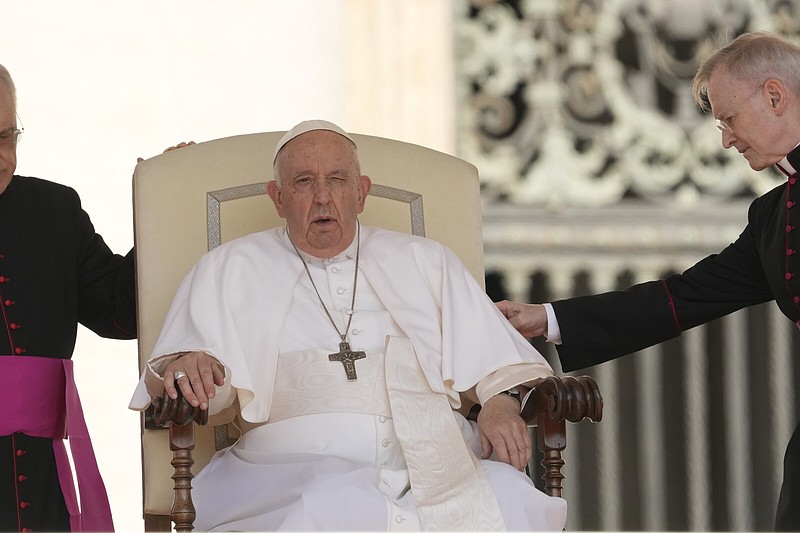ROME -- Pope Francis underwent successful surgery Wednesday to remove intestinal scar tissue and repair a hernia in his abdominal wall, the latest maladies to befall the 86-year-old pontiff who had part of his colon removed two years ago.
The Vatican said there were no complications during the three-hour surgery, which required Francis to be under general anesthesia. The pontiff was expected to remain at Rome's Gemelli hospital for several days, and all papal audiences were canceled through June 18.
Dr. Sergio Alfieri, director of abdominal and endocrine sciences at Gemelli, who also performed Francis' 2021 colon surgery, said the operation was successful. A short time later, the pope was awake, alert and even joking.
"When will we do the third one?" he quoted Francis as saying.
During the operation, doctors removed adhesions, or internal scarring, on the intestine that had caused a partial blockage, as well as pain in recent months. Alfieri revealed that Francis had undergone previous undisclosed abdominal surgeries sometime before 2013 in Argentina, which had also caused scarring.
To repair the hernia that had formed over a previous scar, a prosthetic mesh was placed in the abdominal wall, Alfieri said. He added that the pope was suffering from no other pathologies, that the tissue removed was benign and that after he recovers, he should be fine.
A feared protrusion, or bulging of the intestine through the hernia tear, was apparently not found.
"It appears they operated on him in a timely fashion with no compromise to his intestine," said Dr. Walter Longo, chief of colon and rectal surgery at Yale University School of Medicine, who did not participate in the surgery but commented after consulting the Vatican statement on the procedure.
Hernia operations are rarely performed on an emergency basis, and Alfieri said the surgery had been planned. While unannounced publicly, it appeared timed so Francis would have ample time for recovery ahead of a busy travel schedule later this summer.
At three hours, the pope's procedure was considerably longer than the standard 60 to 90 minutes doctors say a hernia operation usually takes, but Alfieri noted that the scar tissue from the previous surgeries was completely removed.
Spending more time under anesthesia, coupled with being on a ventilator for so long -- in someone who has lost part of one lung as a young man -- could put the pontiff at risk of breathing complications or a longer-than-expected recovery time, experts said.
Francis remained in charge of the Vatican and the 1.3-billion strong Catholic Church, even while unconscious and in the hospital, according to canon law.
In July 2021, Francis spent 10 days at Gemelli to remove 13 inches of his large intestine. In an interview with The Associated Press in January, Francis said the diverticulosis, or bulges in his intestinal wall, that prompted that surgery had returned.
After that surgery, Francis lamented that he hadn't responded well to the general anesthetic. That reaction in part explained his refusal to have surgery to repair strained knee ligaments that have forced him to use a wheelchair and walker for over a year.
However, Alfieri said Francis had no adverse reactions to the anesthesia in 2021 or Wednesday.
"Clearly no one likes to be operated on and put to sleep because the moment we're put under, we lose consciousness," he told an evening news conference at the hospital with the Vatican spokesman by his side. "But there was no physiological problem two years ago or today."
Dr. Manish Chand, a professor of surgery at University College London who specializes in colorectal surgery, said the greatest issue afterwards would be pain management and making sure the wound heals properly.
"In the first six weeks after this type of surgery, you're at risk of getting a recurrence again," he said. To avoid that, patients are advised not to do anything strenuous.
The Argentine pope had part of one lung removed when he was a young man. In late March, Francis spent three days at Gemelli for bronchitis and was treated with intravenous antibiotics. He emerged April 1 saying "Still alive!"
